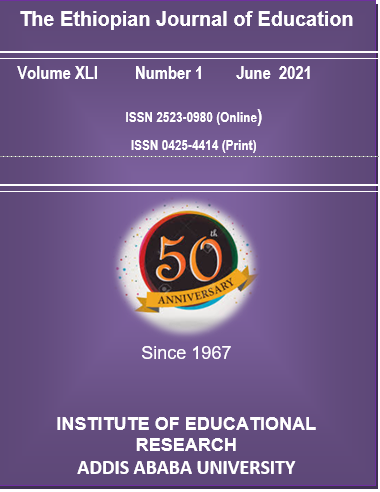Appropriateness, Practice and Challenges of Student Self-Assessment in the Context of Modularized Instruction in Addis Ababa University: Perspectives of Stakeholders
Keywords:
Constructive alignment, modularized instruction, student centered assessment, student self-assessment, self-regulated learning strategies, meta-cognitive skills.Abstract
The major purpose of this study is to examine the level of implementation of student self-assessment and its suitability to modular instruction as well as to identify the underlying factors that affect its implementation. A mixed methods research design was employed in the study. Instructors, deans, department heads and undergraduate students of the College of Education and Behavioral Studies (CEBS) of Addis Ababa University (AAU) were the major sources of data. Questionnaire and Interview were used to collect data from a total of 195 samples . Purposive and proportionate stratified random sampling technique was employed for selecting the samples. Both descriptive (means, percent and SD) and inferential (one-sample t-test, independent samples t-test and one-way ANOVA) statistical tools were used to analyze the quantitative data, while thematic analysis technique was employed to analyze the qualitative data. As to the result of the present study, the study participants believe that, in theory and principle, student self-assessment is strongly aligned with modular instruction in the context of higher education institutions. The study also showed that despite strong belief that self-assessment is directly aligned with modularized instruction; enhances deep learning and can potentially lead to improved academic achievement and motivation, its level of practice in the classroom is minimal (lagging far behind its theory, assumptions and principles) in the CEBS. AAU. The study also concludes that lack of adequate awareness, knowledge and skills on the part of students, the instructors’ tendency to maintain their power and control over assessment, the threat on the part of the instructors that SSA diminishes teachers’ power in decision making and that sharing assessment with students lowers the standards as well as lack of clear criteria for the self-assessment tasks are perceived by the participants as the major bottle necks to the effective implementation of SSA in light of modularized instruction in the CEBS, AAU. The study findings generally imply that the students are still driven by summative assessment and there is little room and time available for the students to engage in self-assessment tasks.
Downloads
Downloads
Published
How to Cite
Issue
Section
License
Copyright (c) 2021 Dame Abera

This work is licensed under a Creative Commons Attribution 4.0 International License.


